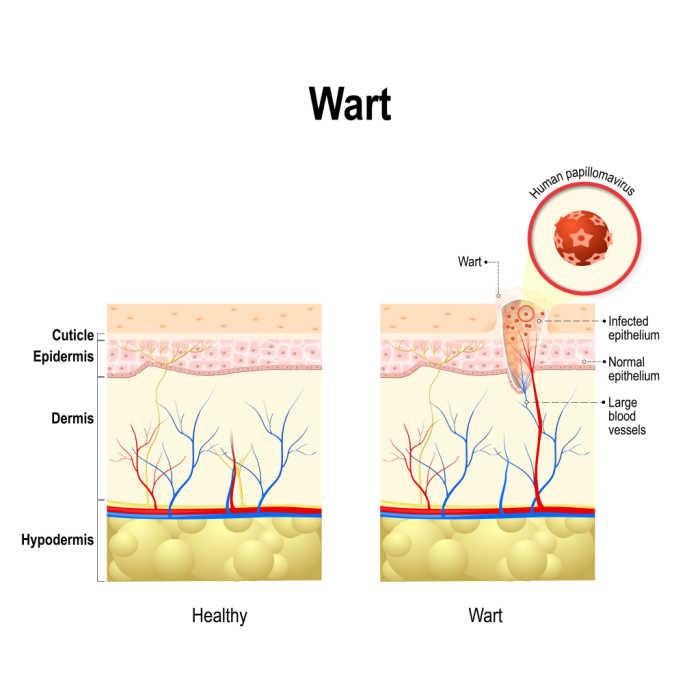It is important to know about female genital warts because they are a common sexually transmitted infection. Female genital warts are caused by the human papillomavirus or HPV, which is a virus that can be passed through skin contact with an infected person.
It is possible to have the virus without realizing it, as not everyone who is exposed will develop symptoms. Genital warts are a sexually transmitted disease, also known as condyloma acuminatum. Learn how to prevent them and what to do if you have them.
What Are Female Genital Warts And How Are They Transmitted
Wart is a common term that is used to describe a small growth or bump on the skin. These growths are typically benign and can be found in several different areas of the body, including around the mouth, fingers, and feet. Genital warts look like whitish or skin-colored bumps.
These warts have a rough surface texture and usually take on the look of cauliflower in appearance. In most cases, they are harmless but may become uncomfortable or painful if they are irritated or subjected to friction. Sometimes, warts may develop on the labia minora of the vagina in women.
Genital warts are caused by a virus called human papillomavirus or HPV, a sexually transmitted virus. This virus can be passed through skin contact with a person who has them. You can get genital warts even if you use condoms or engage in skin-to-skin foreplay because condoms don’t cover all of the genital skin.
Genital warts can cause one or more small bumps on the genitals. Some people will not develop symptoms even after they have contracted HPV; this makes it possible to spread the virus without knowing that you have it. About 70% of sexually active men and women are exposed to HPV during their lives, but very few experience symptoms.
Learn about other STDs with our Ultimate Guide to STDs
Risk Factors for Developing Genital Warts
Genital warts are usually caused by specific strains of the human papillomavirus (HPV), which spreads through direct skin-to-skin contact during sexual activity. Here are the main factors that can increase your risk of developing genital warts:
Unprotected Sexual Activity
Engaging in sex without using condoms significantly increases the risk of HPV transmission. Although condoms provide a measure of protection, they do not fully eliminate the risk.
Multiple Sexual Partners
Having multiple sexual partners increases your chances of being exposed to HPV. The more partners you have, the higher the risk of coming into contact with someone who has the virus.
Weakened Immune System
People with weakened immune systems are more at risk. Conditions like HIV or taking immunosuppressive medications can make it easier for HPV infections to take hold and for warts to persist or get worse.
Early Onset of Sexual Activity
Starting sexual activity at a young age also heightens the risk of contracting HPV. Younger individuals are more susceptible to being exposed to the virus early on.
It’s crucial to understand that while these factors increase the likelihood of developing genital warts, not everyone exposed to HPV will show visible symptoms. Some may carry the virus without any outward signs.

What Are The Symptoms Of Female Genital Warts
The symptoms of female genital warts can vary depending on the individual. The most well-known symptom is their appearance. Genital warts often present as a single growth and sometimes as a cluster of multiple growths. Most of the time, genital warts are painless. In some cases, warts will cause some degree of itching, burning during urination, and vaginal pain, especially if there is friction.
These symptoms of genital warts are usually mild to moderate in nature and may come and go over time. However, there are other potential symptoms that can occur as a result of this infection. For example, genital warts may cause bleeding after sex. This symptom is less common than others but is still a possibility.
If you are experiencing these symptoms, you may have genital warts:
- Flesh-colored or grey growths around your vagina, anus, or upper thighs
- Cauliflower-like growths
- Growths may be internal
- Itching or bleeding from your vagina or anus
- Changes to the flow of urine
Some people will carry the HPV virus and never develop symptoms. They may never know they even have the genital warts virus without a screening from an OBGYN. Symptoms may not appear for weeks, even years after coming in contact with the virus.
What Do Genital Warts Look Like?
Genital warts can have a range of appearances, depending on factors such as the location and severity of the infection.
As mentioned, genital warts appear as small, flesh-colored, or gray growths on the skin or mucous membranes in the genital area. They can be raised or flat and have a rough or smooth texture.
Genital warts can also have a cauliflower-like appearance, with multiple small growths clustered together.
In some cases, genital warts may be so small that they are not visible to the naked eye and are detected through a physical exam or Pap smear.
If you notice any unusual growths or changes in your genital area, it’s essential to see a healthcare provider for an accurate diagnosis and appropriate treatment.
How to Differentiate Genital Warts from Other Conditions
Distinguishing genital warts from other similar conditions can be challenging without professional help. Visually, several conditions may resemble genital warts. Here’s a breakdown to help you tell them apart:
Common Conditions Mistaken for Genital Warts:
1. Skin Tags
- Appearance: Small, soft skin growths that look like a tiny deflated balloon on a stalk.
- Transmission: Not sexually transmitted and are usually harmless.
2. Molluscum Contagiosum
- Appearance: Viral infection causing small, round, flesh-colored bumps.
- Transmission: Can spread through direct skin-to-skin contact, similar to genital warts.
3. Fordyce Spots
- Appearance: Tiny, raised, yellowish, or skin-colored spots found on the genitals or other body parts.
- Cause: Enlarged sebaceous glands, not linked to STIs.
4. Seborrheic Keratosis
- Appearance: Noncancerous, warty growths that can be white, brown, or black, often with a “stuck-on” look.
- Prevalence: More common among older adults; not sexually transmitted.
Distinguishing Features:
- Skin Tags: Typically painless and not prone to changes unless irritated.
- Molluscum Contagiosum: Tend to have a central dimple or indentation in the bump.
- Fordyce Spots: Consistent in appearance and usually do not change over time.
- Seborrheic Keratosis: Often develops a rough, bumpy texture and vary greatly in color.
Similar STI Symptoms:
Certain sexually transmitted infections might mimic genital warts but require distinct treatments:
- Herpes: Presents as painful fluid-filled blisters rather than solid bumps.
- Syphilis: Can begin as a firm, painless sore, evolving over time.
Importance of Professional Diagnosis
If you observe any unusual growths or changes in your genital area, consult a healthcare provider. They possess the expertise to differentiate between genital warts and other conditions accurately. Early diagnosis ensures you receive the appropriate treatment, whether it’s for genital warts or another condition.
How Are Female Genital Warts Treated
In this section, several treatment options will be covered for female genital warts. Treatment options include topical medications, cryotherapy (freezing), laser surgery, and electrosurgery.
Some methods may be more effective than others, depending on the size and location of the warts. Visible warts on the outside of your body are easier to treat. Below are detailed explanations of the mentioned treatments.
Cryotherapy for Female Genital Warts
Cryotherapy is a standard treatment for female genital warts. A healthcare provider uses liquid nitrogen to freeze and destroy the warts during this procedure.
The extreme cold causes the warts to peel off over time. Cryotherapy is often effective for small to medium-sized warts and is relatively quick and straightforward.
However, complete removal may require multiple treatments.
Laser Surgery for Female Genital Warts
Laser surgery is another option for treating genital warts. This procedure uses a focused laser beam to vaporize and remove the warts. Laser surgery is precise and can target warts in delicate areas with minimal damage to surrounding tissue.
Laser surgery Is often recommended for larger or hard-to-reach warts. Recovery time is typically shorter than other treatments but may require multiple sessions.
Electrosurgery for Female Genital Warts
Electrosurgery, or electrocautery, involves using an electrical current to burn and remove genital warts. This method can be effective for warts of various sizes and locations. It’s a quick procedure that cauterizes the warts, helping to stop bleeding and reduce the risk of infection.
However, there may be some discomfort during the process, and multiple sessions may be necessary for complete wart removal.
Topical Medications for Female Genital Warts
Topical medications can treat genital warts, especially in cases where warts are small and widespread. These medications typically contain chemicals that work to destroy the warts over time.
Some examples of topical treatments include:
Podofilox
Podofilox is a gel or solution-based dosage available through a doctor’s prescription used to treat warts between the genitals and rectum.
Imiquimod
Imiquimod is a cream-based dosage available through a doctor’s prescription and applied to help your body fight the viruses that cause warts.
Trichloroacetic acid (TCA).
Trichloroacetic Acid (TCA) is a chemical solution applied through a professional healthcare provider that kills the proteins of genital wart cells.
Through repeated use, warts will gradually decrease in size and eventually disappear.
Applying these medications requires strict adherence to a healthcare provider’s instructions, and visible results may take several weeks. Know that these treatments do not cure HPV infection.
Topical treatments are generally less invasive than cryotherapy, laser surgery, or electrosurgery.
Is Treatment Necessary?
In most cases, treatment is unnecessary if your genital warts are small and you don’t have any severe symptoms. Moreover, genital warts are easier to treat if you begin from the start of noticing them. You also may want to treat genital warts for cosmetic reasons, as they may be embarrassing.
During treatment, avoid irritating soaps and lotions. Having intercourse may also irritate the skin, and it is best to avoid that until treatment is finished. It may take several weeks for a genital wart treatment to be effective, depending on the type of treatment.
Remember, genital warts are different than warts on the hand or feet. Do not try an over-the-counter remedy for these areas, as it could damage the delicate skin in the genital region. Dr. Lodge, an experienced OBGYN in Cool Springs, can prescribe the best course of treatment that won’t damage your skin.
How To Prevent Female Genital Warts
As genital warts are a sexually transmitted infection that can be passed from person to person through skin contact, they can be hard to prevent. There is no sure way to prevent genital warts, and sexually active people are at risk, but there are several steps you can take to reduce your risk of exposure: 
- If you are sexually active, it is important to be aware of the risk of genital warts.
- Use condoms and dental dams every time you have sex or oral sex. You can use male or female condoms to help with this.
- If sharing sex toys, make sure they too are covered in a condom and washed between use.
- Avoid skin-to-skin contact with someone who has genital warts. Sexual contact of the genital area can result in warts even
without full penetration. - If you are your partner has warts, make sure that the infected skin area is covered. Remember that even after treatment, the
virus can still be passed up to 3 months after warts have been removed. - Get vaccinated against HPV. The HPV vaccine is a very effective way to protect yourself against the virus that causes genital warts. This vaccine has been found to prevent 90% of genital warts in young women.
- Get regular screenings for HPV and other sexually transmitted infections. Routine health checks and Pap smears help in the early detection and management of HPV-related conditions.
- Talk about your sexual health with your partner.
- If you are pregnant, there is a chance you could pass them to your baby. Seek guidance from your obstetrician.
Can Female Genital Warts Be Cured
The good news is that warts themselves can be treated and removed. Some genital warts cases will resolve on their own over time, but they cannot be guaranteed to go away entirely without treatment.
Unfortunately, there is no medical cure for the human papillomavirus (HPV) itself. Some people’s bodies are able to clear the virus naturally over time. You will need screenings to confirm if the virus is still active in your body.
There is no such thing as a mild case of genital warts in men or women. If you see the wart or have tested positive for the virus, you have the STI and may be able to transmit it.
Can Genital Warts Recur After Treatment?
Yes, genital warts can recur even after treatment. The primary reason for this is the persistence of the human papillomavirus (HPV) in the body. Although treatments can remove visible warts, they don’t eliminate the virus entirely.
Managing Recurrence:
- Regular Follow-Ups: It’s crucial for individuals who have had genital warts to schedule regular check-ups with their healthcare providers. This helps in early detection and management of any recurring warts.
- Preventive Measures: Adopting preventive strategies, such as using barrier protection during sexual activities, can significantly reduce the risk of recurrence.
- Healthy Lifestyle: Maintaining a robust immune system through a healthy lifestyle—including a balanced diet, regular exercise, and avoiding smoking—can help the body fight off HPV more effectively.
While genital warts can recur, taking proactive measures and working closely with healthcare providers can help manage and reduce the risk.
Complications
Cervical Cancer Caused by HPV
Some strains of HPV can cause cancer. There are low and high-risk strains of HPV that might cause cervical cancer. The highest-risk HPV strains to cause cancer are HPV 16 and 18. These two strains are responsible for about 70% of cervical cancers. Not all types of HPV infections cause cancer, but you should still get a full check-up.
Having HPV and other sexually transmitted infections can make it easier to contract HIV. This is why it’s important for women to get screened regularly as part of a preventative health care routine.
Learn more about HPV>>
Problems During Pregnancy
In rare cases, female genital warts can cause complications during pregnancy. If the warts are present in the birth canal, they can obstruct the baby’s passage during delivery. This obstruction can lead to the need for a cesarean section to avoid harm to the baby.
While female genital warts are not typically life-threatening, they can cause several complications that can impact a woman’s physical and emotional health.
To mitigate the risks for these complications, It is critical to practice safe sex and undergo regular STI testing to prevent the spread of HPV and detect any abnormal cell changes early on.
Urinary obstruction
If the warts are near the urethra, they may grow and obstruct urine flow, leading to discomfort and pain during urination.
Female genital warts can sometimes grow near the opening of the urethra, which is the tube that carries urine from the bladder to the outside of the body.
When this happens, the growth of the warts can obstruct the flow of urine, leading to discomfort and pain during urination. The severity of the urinary obstruction can vary depending on the size and location of the warts.
Sometimes, the obstruction may be mild, causing slight discomfort or a weak urine stream. In more severe cases, the warts can completely block the flow of urine, leading to acute urinary retention, a medical emergency requiring immediate treatment.
Testing For Female Genital Warts
To check for warts themselves, your gynecologist can identify them visually on the exterior and interior of the genitals. They will check for hidden warts inside the vagina. This process should not be painful, and your doctor deals with screenings like this all the time.
To test for the HPV virus, Dr. Lodge will perform a Pap smear. A Pap test checks for abnormalities of cancer in cells collected from your cervix and an HPV test will be done at the same time.
Schedule a Screening for Genital Warts in Cool Springs, Tennessee
If you are experiencing any of the symptoms associated with female genital warts, it is important to seek medical treatment as soon as possible. It is also important for women who are sexually active to be screened for HPV on a regular basis, especially if they have multiple sexual partners.
Please give the staff at Cool Springs OBGYN in Brentwood, Tennessee a call to make an appointment. Call us at 615.690.6600, Monday through Thursday for women’s health care with all the latest advances in gynecology.

